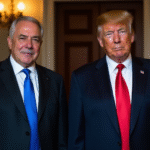Background on Donald Trump and His Influence
Donald J. Trump served as the 45th President of the United States from January 20, 2017, to January 20, 2021. Known for his business background and reality TV fame, Trump’s presidency was marked by controversial policies and decisions. His influence on global affairs, including the Middle East, has been significant during his tenure and continues to impact markets even after leaving office.
The Attack and Its Immediate Impact
On Saturday, the United States launched an attack on Iran’s nuclear facilities, as announced by former President Donald Trump through the social media platform Truth Social. This move deepens US involvement in the Middle East conflict, a concern that had already troubled investors before the weekend.
Market Reactions and Oil Price Surge
Investors anticipate a knee-jerk reaction in global markets when they reopen, potentially driving up oil prices and triggering a flight to safety. There is much uncertainty surrounding the conflict’s course, with initial fears of stock market declines and increased demand for dollars and safe-haven assets.
“I think the markets will be alarmed initially, and I believe oil will open higher,” said Mark Spindel, Director of Investments at Potomac River Capital. “We don’t have an assessment of the damage yet, and it will take some time. Although he called it ‘done,’ we’re committed. What’s next?” Spindel pondered.
“I think uncertainty will envelop the markets as Americans worldwide now become exposed. This will increase uncertainty and volatility, especially in oil prices,” Spindel added.
Economic Implications and Inflation Concerns
One of the primary market concerns revolves around the potential impact of Middle East events on oil prices and, consequently, inflation. Rising energy costs could erode consumer confidence and diminish the likelihood of interest rate cuts.
“This adds a new and complex layer of risk that we’ll need to consider and pay attention to,” said Jack Ablin, Chief Investment Officer at Cresset Capital. “Definitely, this will impact energy prices and potentially inflation as well.”
Oxford Economics’ Analysis of Potential Scenarios
Prior to the US attack on Saturday, analysts at Oxford Economics modeled three scenarios, including conflict de-escalation, a complete shutdown of Iranian oil production, and the closure of the Strait of Hormuz. Each scenario had increasingly significant impacts on global oil prices.
In the most severe case, global oil prices could surge to around $130 per barrel, pushing US inflation close to 6% this year, according to Oxford Economics.
Key Questions and Answers
- What is the immediate impact of the US attack on Iran’s nuclear facilities? Investors anticipate a knee-jerk reaction in global markets, potentially driving up oil prices and triggering a flight to safety.
- How might this affect inflation and consumer confidence? Rising energy costs could erode consumer confidence and diminish the likelihood of interest rate cuts.
- What scenarios have been modeled by Oxford Economics regarding the attack’s potential impact? Analysts at Oxford Economics considered conflict de-escalation, a complete shutdown of Iranian oil production, and the closure of the Strait of Hormuz. In the most severe case, global oil prices could surge to around $130 per barrel.






